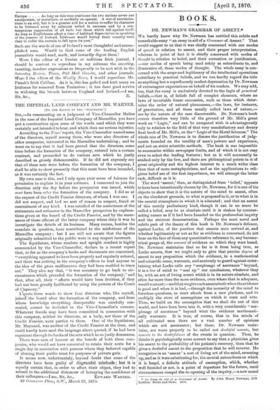THE IMPERIAL LAND COMPANY AND MR. WARNER.
[TO THE EDITOR OF THE "SPECTATOR.']
SIR,—In commenting on a judgment of Vice-Chancellor Melina in the case of the Imperial Land Company of Marseilles, you have put a construction upon some of the words used which they were certainly not intended to hear, and which does me serious injustice.
According to the Times' report, the Vice-Chancellor named some of the directors, myself among them, who were also directors of other companies, interested in the Marseilles undertaking ; and he went on to say that it had been proved that the directors, some time before the formation of the company, entered into a certain contract, and proceeded to do various acts which he justly described as grossly dishonourable. If he did not expressly say that all these acts were before the formation of the company, I shall be able to show presently that this must have been intended, as it was certainly the fact.
My own case is this, and I rely upon your sense of fairness for permission to explain it in your columns. I consented to join the direction only the day before the prospectus was issued, which must have been after the formation of the company. I did so at the request of the Credit Foncier directors, of whom I was one. I did not suspect, and had no sort of reason to suspect, fraud or concealment of any kind. I was satisfied of the correctness of the statements and estimates in the Marseilles prospectus by explana- tions given at the board of the Credit Foncier, and by the assur- ances of those officers of the latter company whose duty it was to investigate the details of its business. Many causes, besides the scandals in question, have contributed to the misfortune of the Marseilles company ; but I am still not aware that the figures originally submitted to the public were in any respect incorrect.
The liquidators, whose resolute and upright conduct is highly commended by the Vice-Chancellor, declare in a recent report that, so far as the company's books and documents are concerned, "everything appeared to have been properly and regularly entered, and there was nothing in the company's offices to lead anyone to the idea of the gross malfeasance they had been enabled to trace out." They also say that, "it was necessary to go back to cir- cumstances which preceded the formation of the company," and that, after all, their " efforts would have been fruitless, if they had not been greatly facilitated by using the powers of the Court of Chancery."
rquote these words to show that directors who, like myself, joined the board after the formation of the company, and from whose knowledge everything disreputable was carefully con- cealed, cannot be included in the Vice-Chancellor's censure. Whatever frauds may have been committed in connection with this company, neither its directors, as a body, nor those of the Credit Foncier, were parties to them. One of the liquidators, Mr. Maynard, was auditor of the Credit Foncier at the time, and could hardly have used the language above quoted, if he had been cognizant through its books of the acts which he so justly denounces.
There were men of honour at the boards of both these com- panies, who would not have consented to retain their seats for a single day in association with persons whom they believed capable of abusing their public trust for purposes of private gain.
It seems now, unfortunately, beyond doubt that some of the directors have been guilty of disgraceful misdeeds ; but it is equally certain that, in order to effect their object, they had to submit to the additional dishonour of betraying the confidence of


































 Previous page
Previous page